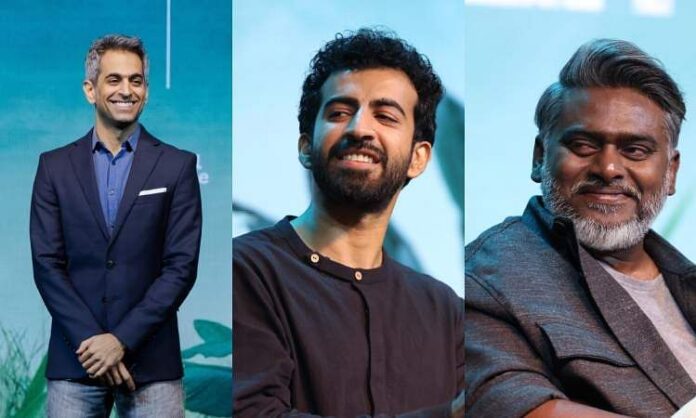In a moment of magical resonance early on in the recently released Poacher, Mala (Nimisha Sajayan) and Alan (Roshan Mathew), head to the forest in their car for a poaching case they are investigating. As they discuss the case, Alan stops the car suddenly and Mala looks at him with a questioning gaze. Alan points ahead to the mystical sight of a dozen elephants, who are making a pass in front of their car. The series, written and directed by Richie Mehta, is filled with such beautiful intersections of humans and animals. Some scenes begin with a fox in the foreground or an owl overlooking the characters from above. Richie feels that humans are nothing but guests to these creatures in the forest. “You will never see most of them in the daytime. But they are certainly aware of you,” he says. “Either an animal is watching you indifferently without getting bothered or is scared to death as soon as any human being appears. I wanted to capture that.”
According to Richie, these hard-to-capture scenes were created using visual effects, which made it possible to portray the dichotomy. “This is something which would not be possible to do ten years ago,” he feels. “So, if technology has opened up all these possibilities, I wanted to use it to show a different point of view. There are some things we have depicted in the show that no one has seen unless you are perpetrating that crime yourself.”
The crime, in Poacher, is that of killing elephants for illegal ivory trade. It is based on a real-life investigation carried out between 2015-17 into elephant poaching in Kerala, that led to multiple arrests. For Richie, the intense research into the case helped him come up with characters and their journeys. “Characters emerge out of the reality of the situation,” he says. “After the research, as I was writing, I asked myself, ‘What can I do to assist the real people in a cause that I believe is very noble?’”. Along with that, meeting different people helped him to give more details to the characters. “There was a biologist I met in Kerala, who had many dogs, and yet, he talked about getting another one. So, I made that part of Mala’s life.”
Mala and Alan are both animal lovers in different capacities. Alan is a snake rescuer and in the first episode, he is called to a hospital to look at a patient who is bitten by a snake. For Roshan, it was not too difficult to interpret the character as he got to meet the real-life person it is based on. “I got in touch with him to understand his life, his reasons and the way he looks at the world,” says Roshan. “For me, it’s not the description of the character that is important but the decisions they take which helps me to understand their psyche.”
Dibyendu Bhattacharya, who plays field director Neel Banerjee in the series, agrees with Roshan. Suffering from cancer, all that Neel wants to do before he dies is catch the poachers involved in the ghastly crime. He is obsessed with turtles and at one point, he makes a confession to a kid about how he wished he was a turtle who can live for over 150 years. “It is a rare thing to play a character who has a complete journey in the story,” Dibyendu says. “My character has his own personal life which collides with his professional life. He is part of something that is bigger than him and I could relate with it because that is the kind of connection I hold with the society,” he adds. “If something like that were to happen to me, what would I do? That is a question I kept coming back to.”
While Roshan tries not to take his work back home, with Poacher, it was difficult. “The information itself was so overwhelming and there are many things that I didn’t know about,” he says. “It helped me understand how there are passionate people in the world who believe in their conscience and keep doing things that really matter.”
According to Richie, Conscience is at the centre of every character in the series. At its core, it is a celebration of the spirit of a few people who stood strongly to hunt down the poachers, despite all the threats to their lives. Richie, too, was guided by a strong sense of conscience while telling the story. “It’s important for human beings to have a conscience,” he says firmly. “I think all of us have it. The question is, how much are we able to listen to it and give it importance on a daily basis. For me, I owe it to the world to act on my conscience.”
#Poacheris #listening #conscienceRichie #Mehta #Cinema #express

